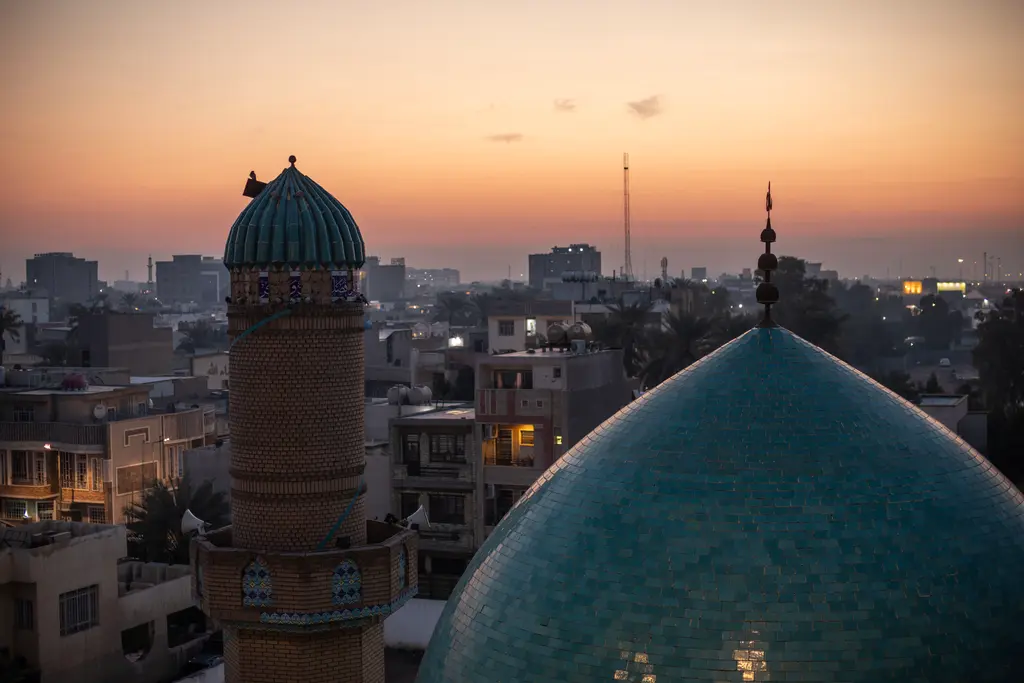Ordos
- Text by James Threlfall
- Photography by Korahn Gayle

When you hear of a city referred to as a ‘ghost town’ you might assume it to be a fictional location or one plagued by the aftermath of catastrophic events. You wouldn’t be blamed failing to guess that the place was actually in a developed country’s second wealthiest region. But this is where Ordos, China, one of the twelve subdivisions of Inner Mongolia, breaks the trend.
I came across the city’s existence during one of my regular Vimeo stumbles, in a short skateboarding film entitled, simply, ‘Ordos.’ The film starts with a group of skateboarders trekking across the vast Ordos desert. A group of bare footed men stroll casually across the top of the dunes, boards in hand, while sand drifts helplessly in the wind.
Ordos’ dramatic inner city architecture is revealed to the viewer with a sudden shot change, and slow motion footage shows the skaters taking advantage of the varied man made landscape. The modern, elegant and flowing terrain the city boasts provides testament to the time and effort invested into the development of the region. Later, the film shows a crew skating freely across a major highway. The only vehicle in sight is a public bus and the only witness appears to be a solitary policeman. I watch in awe. How has this come to be?
Shaky Foundations
The story of Ordos is as remarkable. The city has only existed since 2001, when $585 billion was pumped into the brand new development as part of a scheme to boost China’s economy. After five years of construction it now stands as a symbol of the nation’s wealth, aided by elaborate statues and enormous memorials that celebrate Chinese history, culture and power. It is arguably one of the most modern cities in the world, with bold huge scale architecture. Nobody ever imagined it would stand practically empty. But after being built to house a million, the city has just 20-30,000 residents.
Strangely, Ordos is ranked ahead of the capital Beijing, in terms of income per capita. Despite the underpopulation, finances were ploughed into the city for a reason: the area is rich in natural resources, from textiles to coal mining, petrochemicals and many more. But coal is the city’s biggest asset, which poses problems for its already shaky economy. After extensive media coverage of China’s problems with smog, the country is attempting to shift away from its reliance on coal and reduce consumption.
The Chinese government remains optimistic about the city’s success, moving some of the best local schools there to try and attract families. They hope that this will help to create a snowball effect and bring an influx of residents to the city. Nearly all of the properties have been purchased by investors hoping for a large return. However, while 2006 house prices were at approximately $1,100 per square foot, by the end of 2011 they had plummeted to a mere $470. Fears that collapse will have big effects on the wider economy remain.
Skaters’ Paradise
But for skaters the ghost city offers immense opportunities. “Everywhere that you look there are new structures being built” says pro Korahn Gayle. On a trip to the city with Red Bull earlier in 2013 he was able to explore Ordos in all its glory. “There are so many huge blocks of flats with nobody living in them and the big main roads will never have more than 3 or 4 vehicles in sight at one time. From a skater’s point of view, everything looks great to skate but after jumping on a rail a few times or grinding a ledge it seems to start breaking. The marble seems weak and the metal bends with ease. I don’t think that the city will be able to take the wear and tear of everyday living when it is fully populated.”
But there is another, less positive side to this emptiness. “There was a quite dystopian feeling to Ordos. It’s barren, with very few people living there and the few I did talk to had pessimistic views about the place” says Charles Lanceplain, the filmmaker behind ‘Ordos’. “Imagine a city built for a million but only housing a few thousand… being in such a place was quite incredible. You feel like you actually own the city. Beside a few blocks where the majority of the people live, the rest is empty. We would spend hours skating and not seeing anyone, it really felt like the whole city was ours. It was quite a creepy but exhilarating feeling at the same time.”
Questions Posed
The sense of mystery and intrigue that a place like Ordos evokes in the inquisitive mind goes beyond how and why the city came to be. After the China Coal Research Institute stated that the ‘golden decade for coal is over,’ the most interesting question remains: what sort of future can we expect for a ghost city built on coal?
Check out out Korahn Gayle in a new video from the ghost city, Lost in Ordos.
You might like

In Baghdad, skater girls are reshaping Iraqi womanhood
Baghdad is rad — As the city’s first skatepark opens, the new space is providing a blank canvas for its board culture. Dalia Dawood speaks to the people looking to make its ramps and rails a safe haven for women and girls.
Written by: Dalia Dawood

In England’s rural north, skateboarding is femme
Zine scene — A new project from visual artist Juliet Klottrup, ‘Skate Like a Lass’, spotlights the FLINTA+ collectives who are redefining what it means to be a skater.
Written by: Zahra Onsori

From his skating past to sculpting present, Arran Gregory revels in the organic
Sensing Earth Space — Having risen to prominence as an affiliate of Wayward Gallery and Slam City Skates, the shredder turned artist creates unique, temporal pieces out of earthly materials. Dorrell Merritt caught up with him to find out more about his creative process.
Written by: Dorrell Merritt

Baghdad’s first skatepark set to open next week
Make Life Skate Life — Opening to the public on February 1, it will be located at the Ministry of Youth and Sports in the city centre and free-of-charge to use.
Written by: Isaac Muk

The Chinese youth movement ditching big cities for the coast
In ’Fissure of a Sweetdream’ photographer Jialin Yan documents the growing number of Chinese young people turning their backs on careerist grind in favour of a slower pace of life on Hainan Island.
Written by: Isaac Muk

Revisiting the birth of skate culture in 1970s Los Angeles
New photobook ‘Last Days of Summer: California Skateboarding Archive 1975–1978’ looks back at an iconic chapter of youth culture.
Written by: Miss Rosen